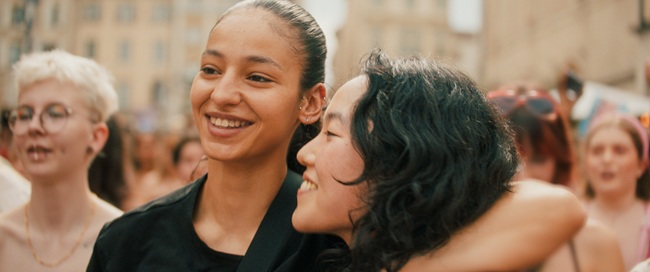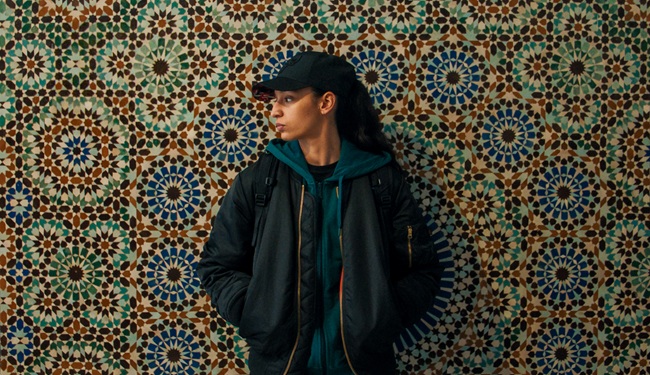‘La Petite Dernière’ Gets a 12-Minute Standing Ovation at Cannes
In coming-out story La Petite Dernière, a young Muslim woman explores new romantic landscapes and fresh heartbreaks
We learn quickly that it’s not a good thing to be gay at the high school where Fatima, the protagonist of La Petite Dernière, attends school. Fatima (Nadia Melliti, a first-time actor) is walking the hallways with her classmate and friend, who calls a gay boy at school a derogatory term. In retaliation, the boy says, “Well, your friend Fatima is a lesbian, don’t you know?” Fatima rages. She becomes violent, attacking the boy and breaking his glasses, and she nearly suffers a full-blown asthma attack in the process. Her friends, all boys, tell her to forget what the boy said. “It doesn’t matter,” they say. But Fatima is scared that her secret will come out.
Scenes like this one and more earned La Petite Dernière a whopping 12-minute standing ovation when it premiered at the 78th Cannes Film Festival. The Hafsia Herzi-directed film is a coming-of-age story about what it’s like to be a Muslim woman of Algerian descent in France who realizes she is gay and coming to terms with that within her family and her culture.

courtesy of the Cannes Press Office
Hiding behind many masks, the protagonist regularly tells people she’s Egyptian instead of Algerian. Fatima has two older sisters who tease her mercilessly about her lack of femininity, the way she dresses, and even her posture. The film’s English title is The Little Sister, and the film is an adaptation of The Last One, a 2020 autofiction novel by Fatima Daas. Fatima is regularly courted by a young man who insists he is her boyfriend, but he can’t take a hint. When he suggests marriage and having a family together, Fatima’s lack of enthusiasm or interest doesn’t deter him in the moment.
Director, screenwriter, and actress, Herzi, previously garnered praise thanks to her debut role in the Franco-Tunisian film, The Secret of the Grain, which earned her an award for most promising actress at the César Awards in 2008. The multi-hyphenate grew up in Marseille and brings a global perspective to her work; her father is Tunisian, and her mother is Algerian. It’s no wonder, then, why a multicultural thread runs through the story lines in La Petite Dernière.
When Fatima meets Ji-Na (Ji-Min Park, star of the 2022 Cannes feature, Retour à Séoul), a Korean woman who works as a nurse where Fatima attends a clinic for her asthma, they each become captivated by each other. In an amusing moment, Fatima notices Ji-Na on a dating app she’s swiping through at the clinic, and then the same woman from her phone screen enters the room to talk about breathing techniques when using asthma inhalers. Fatima is drawn to Ji-Na’s smile.
But behind the smile, the Korean immigrant to France suffers from anxiety and severe depression. Arriving in France at the age of seven and not speaking the language, Ji-Na dreaded going to school. Eventually, her mom returned to Korea, leaving her daughter behind. Fatima and Ji-Na’s relationship ends after Ji-Na reveals a mental health struggle of hers and breaks up with Fatima. “It’s not you, it’s me,” she says, employing the classic breakup line.
The film is cleverly organized into seasons-based chapters, (winter, spring, summer, etc.). In a new chapter of her life, after passing the Baccalauréat – to the pride and pleasure of Fatima’s doting mother – Fatima begins attending university. There, she again gains a circle of friends, all male, who tease her with love and welcome her unquestioningly into their circle. They introduce her to a lesbian couple at a party, and Fatima, when questioned about her sexuality by one of the women, vehemently denies what they (and she) know to be true about herself. One of the women in the couple encourages Fatima to live her life, and not to hide. She asks who broke Fatima’s heart.
Still heartbroken, Fatima experiences a painful moment while standing outside Ji-Na’s apartment. No one ever forgets their first love and their first heartbreak, and for Fatima – stoic and strong as she is – the end of the relationship devastates her. But she carries on. As Fatima continues to discover herself and her preferences with curiosity and a bit of hesitancy, La Petite Dernière delivers a stunning and moving portrait of a young person stepping more fully into her power.
Lead photo credit : courtesy of the Cannes Press Office
More in Cannes film festival




